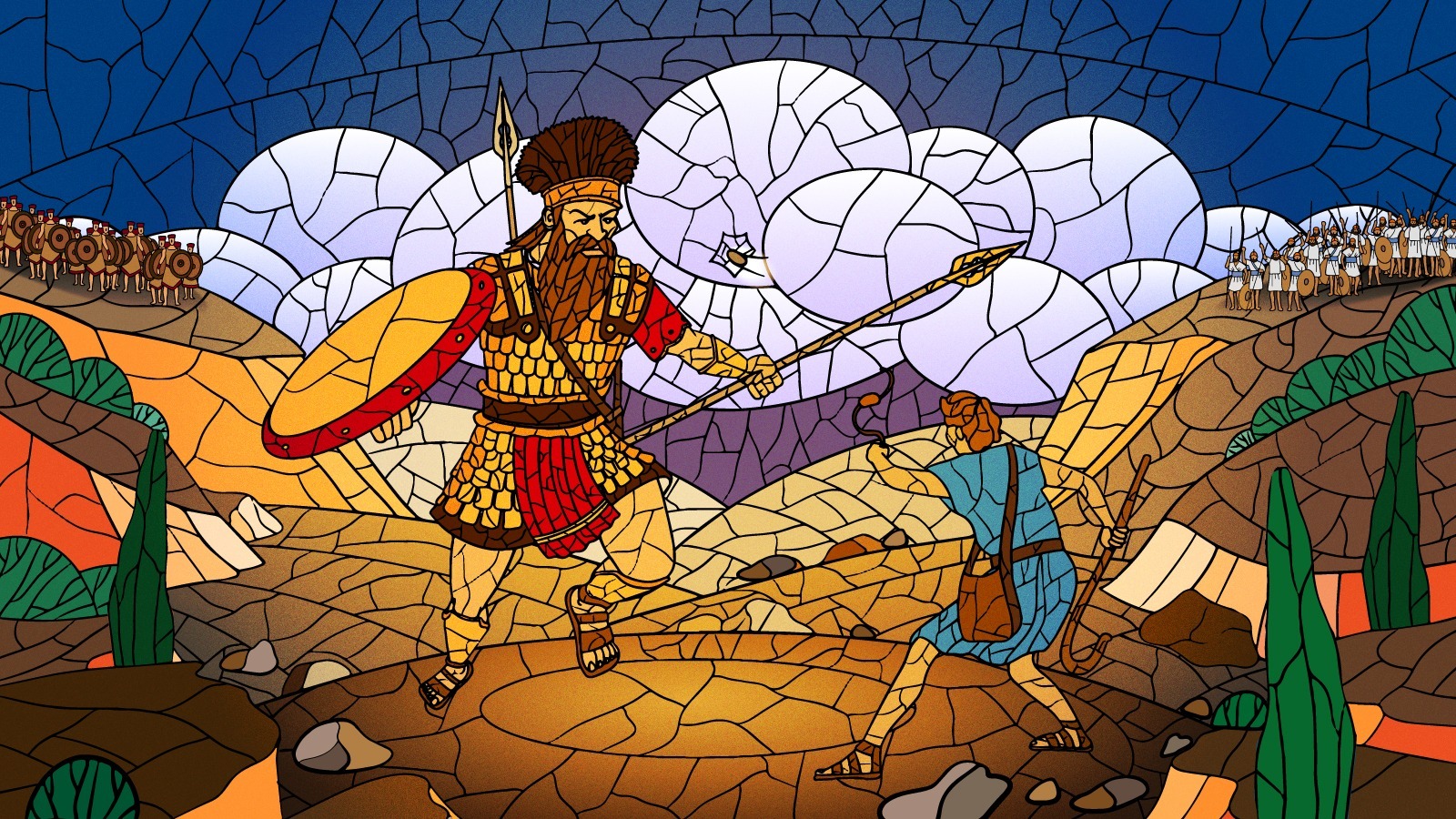David may mean “beloved.” David was in the lineage of Abraham, Isaac, Jacob, and Judah.
Living in Bethlehem within the territory of Judah, Jesse’s youngest son, David, was described as “ruddy, bright eyed, and good-looking” in appearance. Having proclaimed that that the kingdom of Israel would be torn from King Saul, God saw young David’s heart and sent Samuel to anoint David to become the next king of Israel. The Spirit of the Lord came on David from that day forward.
In addition to being a shepherd, David was a gifted musician who King Saul would summon from Bethlehem to play calming music in the king’s presence.
The event that brought David into national prominence was his miraculous defeat of Goliath, champion of the Philistine army. As God had granted David victory over wild beasts in defense of his sheep, so God gave David victory over the mighty, mocking Goliath before the Israelite army prevailed in the battle.
Although celebrated by King Saul initially, David’s popularity grew until he became the object of Saul’s jealousy, rage and eventual plots to execute him. Through help from his wife, Michal (Saul’s daughter), Jonathan (Saul’s son), Samuel, the prophets, and even some of Israel’s enemies, God protected David from King Saul’s murderous plans. During this period of persecution, David garnered a following of 400 loyal men, but he never engaged in a coup or personal revenge against King Saul.
After King Saul and three of his sons died in battle, David was anointed King of Judah and reigned from Hebron for 7.5 years. A civil war between Judah and the other Israelite tribes arose during this period because of a challenge to David’s kingship involving Saul’s surviving son. At the conclusion of the war, David united the tribal factions and was anointed the King over all Judah and Israel. David established a new capital at the city of Jerusalem, a portion of which became known as “The City of David” from which David reigned another 33 years. God gave King David and the Israelite army victory over their enemies and expanded the nations’ borders to reach most of the Land He had initially promised to Abraham. In the latter years of David’s reign, relative peace was enjoyed and the wealth of the nation grew substantially.
David expressed a desire to build God a “house” or a temple, where the ark of the covenant would be permanently housed. God, however didn’t allow this because David had shed so much blood as a warrior. God, however, promised that David’s son, a man of peace would build “the house for God’s name.” In these promises, often called the Davidic Covenant, God promised to David a never-ending dynasty, a throne over Israel, and an everlasting kingdom ruled forever by a righteous descendant/seed of David.
Despite God’s proclamation that David was a man after His own heart, David was still a sinner. David’s sin became publicly known after he coveted another man’s wife and committed adultery with her. When the woman, Bathsheba, became pregnant, David tried to hide his sin and had her husband, Uriah, killed in battle. David married Bathsheba after Uriah’s death.
When God’s prophet Nathan confronted David about such egregious sins, David repented sorrowfully. Though deserving of it according to the Law and his own judgments, David did not receive the physical death penalty for this series of sins, but his illegitimate son died soon after birth, and his household suffered much turmoil in the remaining years of David’s life. Among David’s children were awful tragedies including incest, revenge murder, division, and treasonous rebellion against David’s kingship. David’s second son with Bathsheba, Solomon, became the successor to David’s throne.
With the exception of a later prideful census that David ordered which incurred God’s temporary judgment on the nation, David reigned harmoniously with the priesthood and prophets. David communed with God, received covenant promises from God, wrote much of the Book of Psalms. Though David is known primary as a king, he was also used by the Holy Spirit as a prophet, foretelling future events associated with David’s ultimate descendant, Jesus.
Key verses: 1 Samuel 16:2,7,12; 17:45-51. 2 Samuel 2:1,4; 5:1-5; 6:17,18; 7:12-16; 12:9-13; 22:47-51; 23:2,3,5,Matthew 1:1,6,19-21 Mark 10:47; 12:35-37 John 7:42 Romans 15:12 Revelation 5:5

